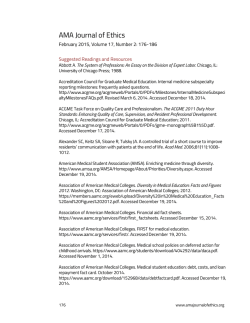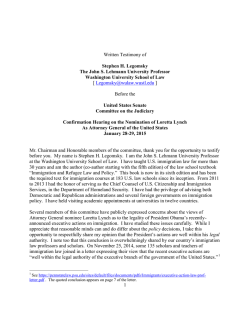
Equity for “DREAMers” in Medical School Admissions
AMA Journal of Ethics February 2015, Volume 17, Number 2: 152-156 POLICY FORUM Equity for “DREAMers” in Medical School Admissions Mark G. Kuczewski, PhD, and Linda Brubaker, MD, MS Where We Are and How We Got Here In the autumn of 2012, the Loyola University Chicago Stritch School of Medicine became the first medical school in the nation to amend its admissions policy to welcome applications from “DREAMers”—undocumented immigrants who were brought to the United States as children, i.e., prior to the age of 16, and have been raised and educated in the United States for more than five years—who have “DACA” (Deferred Action for Childhood Arrivals) status [1]. DREAMers are so called for the oft-introduced, but never passed into law, federal DREAM (Development, Relief, and Education of Alien Minors) Act. In many cases, DREAMers came to the United States as very young children and may have little direct experience with the countries in which they were born. Loyola Stritch’s journey was motivated by an inquiry from a professor at another Jesuit university regarding a highly qualified DREAMer undergraduate student he was mentoring [2, 3]. We immediately wished to entertain this student’s application for several reasons that we believe are valid for any medical school. 1. The student was described as having outstanding academic qualifications, i.e., a very high grade point average while double majoring in biology and Spanish, and a record of service. 2. The student was clearly bilingual and likely bicultural, having insight into both life in the United States and the immigrant experience. In short, this student had a very desirable profile. Medical schools want the most highly qualified candidates and do not want to disqualify students with strong academic credentials arbitrarily. And they wish to produce a diverse workforce that is prepared to meet the needs of evolving communities physicians must serve. This student seemed to bring together the best of both kinds of qualities. Loyola University Chicago, as a Jesuit and Roman Catholic university, proclaims the promotion of social justice as part of our mission [4]. Social justice, as understood in Jesuit education, requires that all members of the community have access to full participation in the life of the community and are not excluded owing to accidents of social class and birth [5]. This mission clearly sensitized us to the urgency of this student’s situation. A commitment to fostering social justice is also, we believe, related to the mission of academic medicine. Injustice and exclusion contribute to health and health care inequities; medicine must work to alleviate such barriers for the common good. Until recently, DREAMers faced a seemingly insurmountable barrier to practicing medicine. Namely, they had no authorization to work in the United States. This meant that, while 152 www.amajournalofethics.org there was no legal barrier to their receiving medical educations, these students would be unable to pursue residency training and licensure. Thus, medical schools were rightly concerned about the prudence of devoting substantial resources to the education and training of these students when, most likely, they would be unable to fulfill the goal of serving the health care needs of the community. This changed when President Obama created the Deferred Action for Childhood Arrivals (DACA) program in June 2012 [6]. DACA draws on the criteria from various versions of the DREAM Act to describe a group of DREAMers who may register with the federal government and be granted two-year, renewable deferrals of action regarding their immigration status [7]. DACA status brings with it an Employment Authorization Document (EAD), colloquially called a “work permit,” and eligibility for a Social Security number. In most states, this removes any legal or regulatory barriers to licensure and a residency slot [1]. With the creation of DACA status, the leadership of the Loyola Stritch School of Medicine moved to change its published eligibility requirements to make it possible for DREAMers to apply [8]. Our website was amended to say that applicants must be US citizens, hold a permanent resident visa, or be eligible for the DACA process of the US Citizenship and Immigration Services at the time of application. This accelerated the dialogue about DREAMers among medical schools and the Association of American Medical Colleges (AAMC). Should all medical schools mirror Loyola’s policy? What about the financial aid needs of these students? We can unequivocally assert that we believe that the mission of academic medicine is best served by all medical schools’ acknowledging these students as eligible for admission. We might go even further and argue that to deny applications based on students’ DACA status is unjustified discrimination. When we realized that qualified DACA-status applicants had everything they needed to eventually become licensed, practicing physicians, we could see no justification for the exclusion of their applications. However, those few state medical schools located in states that have anti-immigrant laws preventing the licensure of undocumented immigrants may present an exception because they are, in some ways, still in the situation that we encountered prior to the creation of DACA. Two things should become standard across medical schools. First, there is a need for academic medicine to adopt uniformly open and transparent policies in regard to DACA applicants. Second, medical schools need to develop equitable financial aid options for DREAMers who matriculate. Uniform and Transparent Admissions Policies We know some things for certain. The best news is that at least three medical schools have joined the Loyola University Chicago Stritch School of Medicine in revising their admissions policies to declare explicitly that DACA-status students are eligible for admission [9-11]. Fourteen other schools have given the AAMC permission to list them as willing to consider DACA-status applicants [12]. These schools are to be commended for their transparent approach. Unfortunately, according to an AAMC survey, about the same number of schools would accept a student with DACA status but have not chosen to be AMA Journal of Ethics, February 2015 153 transparent about that intent [13]. But this transparency is necessary from both a practical and moral perspective. From a practical standpoint, it makes little sense to deny prospective applicants the knowledge of whether their application is welcome or not. Obscuring one’s policy leads to much wasted effort: by prospective applicants in trying to determine their eligibility for admission, by DACA-status applicants applying to schools only to be denied prior to review, and by schools that would entertain such applications failing to attract them. It only makes sense for all schools to be clear about their policy concerning eligibility to apply. But it is also morally important that medical schools publicly declare their receptiveness to applications from immigrants, both legal and undocumented. Accepting DACA applicants without publicly acknowledging their eligibility is no more morally commendable than would be accepting applicants from any excluded group and obscuring that fact. Of course, much of this lack of transparency may be caused by a concern that the school will receive many worthwhile applications from these students for whom the school may have insufficient financial aid resources. Equitable Financial Aid Options We believe that DREAMers should have access to financial aid packages comparable to those of their citizen peers. Despite their DACA status, DREAMers remain ineligible for federal student loans, a key part of most medical students’ financial aid packages. This presents a major challenge for most medical schools. As a result, medical schools may choose to accept very few DACA students or to accept such students and then make the financial aid decisions separately. In the latter situation, students may receive insufficient aid to enable them to attend, or the school may choose to direct large amounts of scholarship money to one or more such students. We have argued elsewhere that, given the inequity inherent in the lack of access to federal aid, schools are justified in using large amounts of scholarship resources for these students [14]. However, considerations of equality and solidarity counsel that more creative options be developed. The Loyola University Chicago Stritch School of Medicine worked with the infrastructure bank of the State of Illinois, the Illinois Finance Authority (IFA), to create a DACA student loan program modeled on public health service loans. These loans require DACA students to provide a year of service to underserved populations or in a physician-shortage area within the state of Illinois for each year that they use these loan monies. This loan program, which uses no taxpayer funds, is an investment in the physician infrastructure of the state. Schools within states such as Illinois should avail themselves of these options, and others could pursue similar creative options within their locales [15]. Of course, enlisting the support of state governments and foundations can take a long time and may not be successful. In the more immediate future, it is probably desirable for schools to break out of a paradigm in which they either support the student’s financial need entirely through scholarships or provide inadequate aid to meet the student’s needs. For instance, medical schools can consider using financial aid funds to develop schoolbased loan programs, blending loans and scholarship funds to achieve financial aid 154 www.amajournalofethics.org packages comparable to those the members of their student body typically receive. In this way, schools may continue to foster equality among their students. Conclusion Because of political controversy, the health needs of immigrants go unaddressed in the United States and become the province of the emergency rooms of our hospitals. It is imperative that academic medicine educate the public directly and by example about the importance of access to health care and to a health care workforce equipped to meet the needs of our communities. Academic medicine has a duty to develop a workforce that is able to serve the needs of the diverse patients and communities of the United States. Allowing qualified DREAMers to receive a medical education is an important step forward in fulfilling that mission [16], and it is important that academic medicine rise above political controversies and current biases to take that step. The trust of the public in the medical profession requires that medical schools act justly and transparently rather than fail to act for fear of controversy. References 1. Loyola University Chicago Stritch School of Medicine. DREAMers of DACA status welcome. http://www.stritch.luc.edu/daca. Accessed December 18, 2014. 2. Garcia M. Students not legal—but superb. Chicago Sun-Times. October 30, 2014. http://www.suntimes.com/news/garcia/30742282-452/students-not-legal-butsuperb.html. Accessed November 1, 2014. 3. Kuczewski MG, Brubaker L. Accepting undocumented immigrants: how we became the “medical school of dreams” and Dreamers. AM Rounds: Beyond the Pages of Academic Medicine. July 3, 2014. http://academicmedicineblog.org/acceptingundocumented-immigrants-how-we-became-the-medical-school-of-dreamsand-dreamers/. Accessed November 1, 2014. 4. Loyola University Chicago. Mission and identity. http://www.luc.edu/mission/ mission_vision.shtml. Accessed December 14, 2014. 5. Social Justice and Ecology Secretariat. The promotion of justice in the universities of the society. Promotio Institutiae. 2014;3:2-53. http://www.sjweb.info/docu ments/sjs/pj/docs_pdf/PJ_116_ENG.pdf. Accessed December 17, 2014. 6. Secretary Napolitano announces deferred action process for young people who are low enforcement priorities [news release]. Washington, DC: US Office of Homeland Security; June 15, 2012. http://www.dhs.gov/news/2012/06/15/secretarynapolitano-announces-deferred-action-process-young-people-who-are-low. Accessed December 17, 2014. 7. US Citizenship and Immigration Services. Consideration of deferred action for childhood arrivals (DACA). Updated December 4, 2014. http://www.uscis.gov/ humanitarian/consideration-deferred-action-childhood-arrivals-daca. Accessed November 1, 2014. 8. Loyola University Chicago Stritch School of Medicine. Admission. http://www.stritch.luc.edu/admission. Accessed December 19, 2014. 9. Rivero E. US medical schools urged to increase enrollment of undocumented immigrants [news release]. Los Angeles, CA: UCLA; August 6, 2014. http://newsroom.ucla.edu/releases/u-s-medical-schools-urged-to-increaseenrollment-of-undocumented-immigrants. Accessed November 1, 2014. AMA Journal of Ethics, February 2015 155 10. Long K. UW medical school to allow nonlegal residents. Seattle Times. September 30, 2014. http://seattletimes.com/html/localnews/2024665852_dacamedschool 11. xml.html. Accessed November 1, 2014. 12. University of California Irvine School of Medicine. Frequently asked questions. http://www.meded.uci.edu/admissions/faqs.asp. Accessed November 11, 2014. 13. Association of American Medical Colleges. Medical school policies on deferred action for childhood arrivals. https://www.aamc.org/students/download/404292/ data/daca.pdf. Accessed November 1, 2014. 14. Greenberg R. AAMC extends fee assistance program to students with DACA status; admissions policies open doors. AAMC Reporter. October 2014. https://www.aamc.org/newsroom/reporter/412110/fee-assistance.html. Accessed November 1, 2014. 15. Kuczewski MG, Brubaker L. Medical education for “Dreamers”: barriers and opportunities for undocumented immigrants. Acad Med. 2014;89(12):1593-1598. 16. Schorsch K. A year later, Loyola still alone in enrolling undocumented students. Crain’s Chicago Business. August 9, 2014. http://www.chicagobusiness.com/article/ 20140809/issue01/308099984/a-year-later-loyola-still-alone-in-enrollingundocumented-students. Accessed November 1, 2014. 17. Balderas-Medina Anaya Y, Del Rosario M, Doyle LH, Hayes-Bautista DE. Undocumented students pursuing medical education: the implications of deferred action for childhood arrivals (DACA). Acad Med. 2014;89(12):1599-1602. Mark G. Kuczewski, PhD, is the Fr. Michael I. English, SJ, Professor of Medical Ethics, director of the Neiswanger Institute for Bioethics and Health Policy, and chair of the Department of Medical Education at Loyola University Chicago Stritch School of Medicine. Much of his recent work advocates for fair treatment for undocumented immigrants in the health system and in medical education. Linda Brubaker, MD, MS, is the dean of the Loyola University Chicago Stritch School of Medicine, where she is chief diversity officer and a professor of urology and obstetricsgynecology. She is also interim provost of the Health Sciences Division at Loyola University Chicago. Her interests include female pelvic reconstruction surgery, surgical outcomes, and devices and medications for incontinence. Related in AMA Journal of Ethics Unjustified Barriers for Medical School Applicants with Physical Disabilities, February 2015 Legacy Admissions in Medical School, December 2012 Bias in Assessment of Noncognitive Attributes, December 2012 Affirmative Action and Medical School Admissions, December 2012 Promoting the Affordability of a Medical Education to Members of Groups Underrepresented in the Profession: The Other Side of the Equation, February 2015 The viewpoints expressed in this article are those of the author(s) and do not necessarily reflect the views and policies of the AMA. Copyright 2015 American Medical Association. All rights reserved. ISSN 2376-6980 156 www.amajournalofethics.org
© Copyright 2026
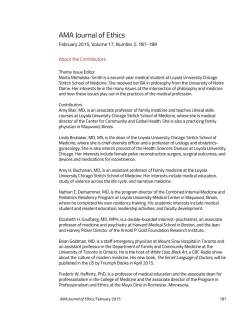
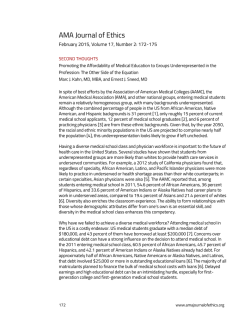
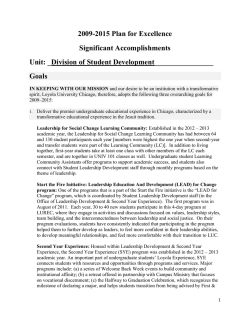

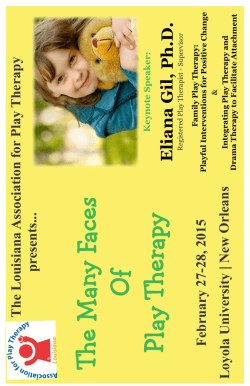
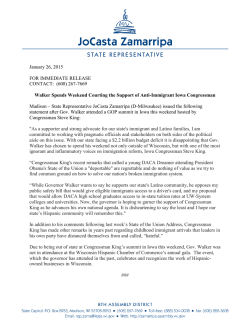
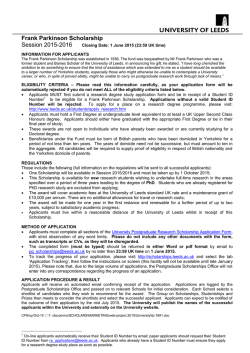
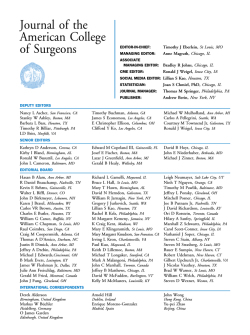
![Part 3: POL[ICE] IN MY HEAD - Undocumented and Uninsured](http://s2.esdocs.com/store/data/001572682_1-e22b907fdfffd79505360f8a293e85ef-250x500.png)
